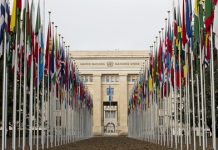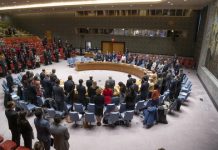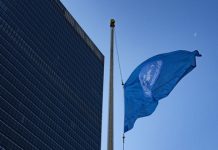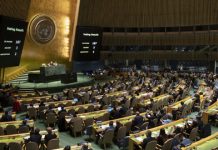Gazans need polio vaccines as they face a ‘deathly cycle’ of hunger, heat and disease, say humanitarians
In a bid to prevent a polio epidemic in Gaza, UN humanitarians on Tuesday repeated international calls for a ceasefire to allow a mass vaccination campaign to get underway.
Almost 10 months of war and intense Israeli bombardment have shattered healthcare in Gaza and disrupted routine inoculation rounds for youngsters, leaving them exposed to a range of preventable diseases – including polio, which the UN World Health Organization (WHO) said had been identified last month in sewage samples.
Here’s WHO spokesperson Christian Lindmeier:
“We need a ceasefire – the best – but at least cleared and safe roads, safe access. Otherwise, the vaccines would be sitting as many other trucks are across the border, either on the Rafah side or at the other checkpoints either inside or just inside or outside Gaza, with not much help.”
No cases of paralysis linked to the virus have been reported so far, according to WHO, which announced one week ago that it was sending one million polio vaccines to Gaza.
The UN Children’s Fund UNICEF said that if a child receives the full course of vaccines, the risk of contracting paralyzing polio is “negligible”.
Vaccination rates in Gaza were as high as 99 per cent before war erupted last October after Hamas-led terror attacks in southern Israel, but they have now dropped to around 89 per cent – increasing the risk for children.
1 in 3 victims of trafficking is a child, warns UN migration agency
Every year, millions of children around the globe fall prey to human trafficking – that’s the worrying alert from the UN migration agency, IOM, which on Tuesday urged all countries to do more to prevent and stop the criminal activity.
Marking the World Day against Trafficking in Persons on 30 July, the UN agency said that more than one in three victims of trafficking is a child, as it called for governments to provide more protection and assistance to the children who fall victim to the crime.
IOM said that many crises around the world have led to “an unprecedented number of children on the move, whether as migrants, asylum-seekers, refugees or internally displaced” people.
Children – particularly when they are alone – are at greater risk of human rights violations than adults, along with violence and exploitation, the UN migration agency insisted, as it cited data showing that over the past 15 years, the proportion of identified child trafficking victims has tripled, with the number of boys among them increasing fivefold.
In Sub-Saharan Africa, North Africa, Latin America and the Caribbean, children account for up to 73 per cent of known trafficking victims.
Of all detected victims of trafficking globally, girls represent 18 per cent and boys 17 per cent.
South Asia flooding leaves more than six million youngsters at risk
More than six million children in South Asia are at risk following severe torrential rains, flash floods, and landslides that have devastated the region, leaving many homeless, the UN Children’s Fund (UNICEF) has warned.
Halfway through the monsoon season, in Nepal, 109 people have died in floods and landslides. This includes 65 people who were on two buses pushed into a swollen river by landslides.
In Afghanistan, flash floods last week swept away several hundred homes, claiming at least 58 lives and leaving hundreds of families homeless, UNICEF reported.
Sanjay Wijesekera, UNICEF Regional Director for South Asia, expressed concern that the latest “erratic” weather patterns had been worsened by climate change, while humanitarians are fearful of the impact of heavier rains forecast in the coming weeks.
The UNICEF official also warned that floods pose a threat to children beyond death and injury, including contaminated safe water and an increased risk of disease and diarrhoea.
Children affected by frequent flooding over time are also more likely to be underweight and stunted, the UN agency noted.
Music composed and produced by Joachim Harris. All rights reserved
Source of original article: United Nations (news.un.org). Photo credit: UN. The content of this article does not necessarily reflect the views or opinion of Global Diaspora News (www.globaldiasporanews.com).
To submit your press release: (https://www.globaldiasporanews.com/pr).
To advertise on Global Diaspora News: (www.globaldiasporanews.com/ads).
Sign up to Global Diaspora News newsletter (https://www.globaldiasporanews.com/newsletter/) to start receiving updates and opportunities directly in your email inbox for free.






























